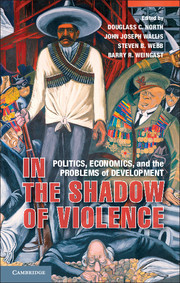Description
In the Shadow of Violence
Politics, Economics, and the Problems of Development
Coordinators: North Douglass C., Wallis John Joseph, Webb Steven B., Weingast Barry R.
This book explains how political control of economic privileges is used to limit violence and coordinate coalitions of powerful organizations.
Language: English
Subject for In the Shadow of Violence:
In the Shadow of Violence
Publication date: 11-2012
Support: Print on demand
Publication date: 11-2012
Support: Print on demand
In the Shadow of Violence
Publication date: 11-2012
376 p. · 15.7x23.5 cm · Hardback
Publication date: 11-2012
376 p. · 15.7x23.5 cm · Hardback
Description
/li>Contents
/li>Biography
/li>
This book applies the conceptual framework of Douglass C. North, John Joseph Wallis and Barry R. Weingast's Violence and Social Orders (Cambridge University Press, 2009) to nine developing countries. The cases show how political control of economic privileges is used to limit violence and coordinate coalitions of powerful organizations. Rather than castigating politicians and elites as simply corrupt, the case studies illustrate why development is so difficult to achieve in societies where the role of economic organizations is manipulated to provide political balance and stability. The volume develops the idea of limited-access social order as a dynamic social system in which violence is constantly a threat and political and economic outcomes result from the need to control violence rather than promoting economic growth or political rights.
1. Limited access orders: an introduction to the conceptual framework Douglass C. North, John Joseph Wallis, Steven B. Webb and Barry R. Weingast; 2. Bangladesh: economic growth in a vulnerable LAO Mushtaq H. Khan; 3. Fragile states, elites, and rents in the Democratic Republic of Congo (DRC) Kai Kaiser and Stephanie Wolters; 4. Seeking the elusive developmental knife-edge: Zambia and Mozambique – a tale of two countries Brian Levy; 5. Limited access orders: the Philippines Gabriella R. Montinola; 6. India's vulnerable maturity: experiences of Maharashtra and West Bengal Pallavi Roy; 7. Entrenched insiders: limited access order in Mexico Alberto Diaz-Cayeros; 8. From limited access to open access order in Chile, take two Patricio Navia; 9. Transition from a limited access order to an open access order: the case of South Korea Jong-Sung You; 10. Lessons: in the shadow of violence Douglass North, John Wallis, Steven Webb and Barry Weingast.
Douglass C. North is co-recipient of the 1993 Nobel Memorial Prize in Economic Science. He is Spencer T. Olin Professor in Arts and Sciences at Washington University in St. Louis and Bartlett Burnap Senior Fellow at the Hoover Institution at Stanford University. A member of the American Academy of Arts and Sciences, Professor North received the John R. Commons Award in 1992. He is author of eleven books, including Institutions, Institutional Change, and Economic Performance (1990), Understanding the Process of Economic Change (2005), and co-author, with John Joseph Wallis and Barry R. Weingast, of Violence and Social Orders: A Conceptual Framework for Interpreting Recorded Human History (Cambridge University Press, 2009).
John Joseph Wallis is Professor of Economics at the University of Maryland and a research associate at the National Bureau of Economic Research. He received his PhD from the University of Washington in 1981 and had a two-year postdoctoral fellowship at the University of Chicago. Professor Wallis is an economic historian who specializes in the public finance of American governments and more generally in the relation between the institutional co-development of governments and economics. His large-scale research on American state finance and institutions has been supported by the National Science Foundation.
Steven B. Webb worked at the World Bank for twenty-one years as an economist and advisor on policy research, evaluation and operations for Latin America and the Caribbean and other regions. He currently serves as a consultant to the Bank. Dr Webb's specializations include political economy, decentralization, public finance, central banks and monetary policy and economic history. His publications include Public Sector Reform – What Works and Why (2008), Achievements and Challenges in Decentralization (2000) and Voting for Reform: The Politics of Adjustment in New Democracies (1994, edited with Stephan Haggard).
Barry R. Weingast is the Wa
John Joseph Wallis is Professor of Economics at the University of Maryland and a research associate at the National Bureau of Economic Research. He received his PhD from the University of Washington in 1981 and had a two-year postdoctoral fellowship at the University of Chicago. Professor Wallis is an economic historian who specializes in the public finance of American governments and more generally in the relation between the institutional co-development of governments and economics. His large-scale research on American state finance and institutions has been supported by the National Science Foundation.
Steven B. Webb worked at the World Bank for twenty-one years as an economist and advisor on policy research, evaluation and operations for Latin America and the Caribbean and other regions. He currently serves as a consultant to the Bank. Dr Webb's specializations include political economy, decentralization, public finance, central banks and monetary policy and economic history. His publications include Public Sector Reform – What Works and Why (2008), Achievements and Challenges in Decentralization (2000) and Voting for Reform: The Politics of Adjustment in New Democracies (1994, edited with Stephan Haggard).
Barry R. Weingast is the Wa
© 2024 LAVOISIER S.A.S.



